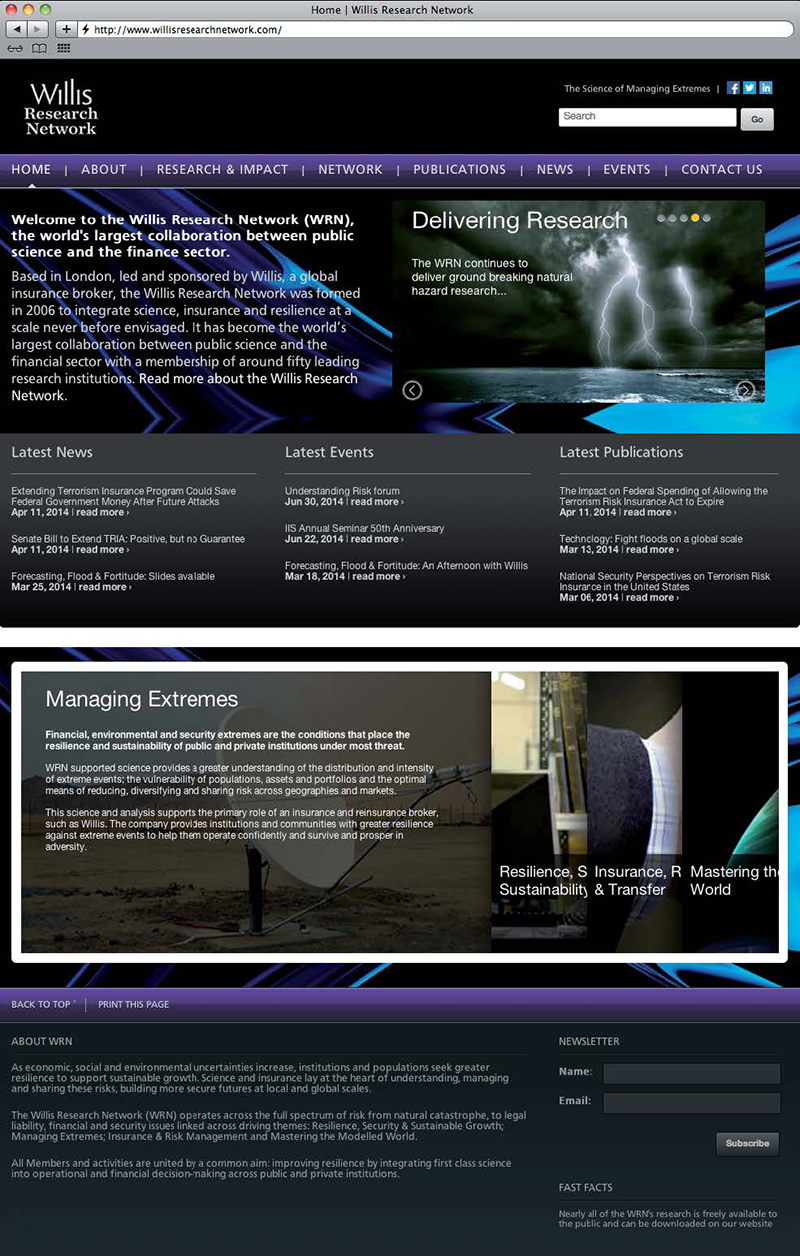Jason Howard
CEO of Faber Global
Willis Group
London - United Kingdom
Madrid - EspañaMarkets
Jason Howard joined Willis Faber and Dumas in 1997 as an Executive Director in the Reinsurance Division handling Latin American non-marine reinsurance business, where he was responsible for designing and implementing reinsurance solutions for clients. He previously spent eight years at Willcox, the reinsurance arm of Johnson & Higgins, in London.
July 2003 saw Jason Howard promoted to Regional Director for the Latin American and Caribbean team in London, before being appointed in 2004 as Managing Director of the Latin American and Caribbean team for Willis Re.
In February 2007, Jason Howard was appointed Chief Executive Officer of Willis Re International, with responsibility for running the operations of the division. At that time he was appointed to the Global Executive of Willis Re.
On 1st January 2010, he was appointed Chief Executive Officer of Willis Re International and Specialty.
In January 2012, Jason Howard was appointed Chief Executive Officer of Glencairn Limited. In February 2012, he oversaw the creation of Faber Global by combining Willis Facultative and Glencairn into a single entity.
Jason Howard holds an Honours degree in Business Administration from the European Business School.




“Without either a significant market event or a large scale withdrawal of market capacity I cannot see the situation changing in the global reinsurance markets for quite a while”
As one of the world’s leading insurance and reinsurance brokers, Willis Group has a strong foothold in both mature and emerging markets. We spoke to Jason Howard, CEO of Faber Global, the facultative and wholesale reinsurance arm of Willis, to find out about the Group’s past, its present and where it is heading in the future.
Please could you tell me a little about the history of Willis and where it stands in the market today?
Willis has a long distinguished history in the insurance market dating back almost 200 years. Fast forward to 2014 and we are now one of the world’s leading insurance and reinsurance brokers, providing a full range of analytical capabilities delivered in conjunction with our transactional services to clients.
From a business perspective, Willis Group is always looking to grow, and now has 18,000 associates around the globe. In terms of our financials, our reported net income from continuing operations for 2013 was USD 365 million.
What is Willis’s involvement in Spain?
Willis has been involved in the Spanish market for many years, and is a significant broker there in both the insurance and reinsurance markets.
How are you positioned to offer clients alternative forms of coverage?
Willis Capital Markets & Advisory is our specialized investment banking boutique exclusively focused on the insurance industry. It utilizes the vast insurance knowledge base residing in Willis Group to deliver M&A, strategic, capital raising and IPO (Initial Public Offering) advisory services as well as equity, debt, contingent capital and insurance-linked securities underwriting.
Willis has a long distinguished history in the insurance market dating back almost 200 years. Fast forward to 2014 and we are now one of the world’s leading insurance and reinsurance brokers, providing a full range of analytical capabilities delivered in conjunction with our transactional services to clients
Willis Re also has extensive experience placing a broad range of transactions with ILS funds ranging from traditional reinsurance and retrocession deals to private catastrophe bonds.
What is your global market view, and that of the Spanish market in particular?
Prices are falling in many areas of the global reinsurance market. As noted in Willis Re’s 1st View January 2014 renewals report, some US accounts saw rate reductions of up to 25% at January 1 2014.
The Spanish reinsurance market has witnessed a significant reduction in premium from cedants. Many insurers in Spain are looking to reduce their costs and this has impacted the amount of premium available to reinsurers. That said, price reductions have not been as severe in Spain as they have been in other parts of the world, with reductions of around 2% at January 1st on non-loss affected accounts.
Without either a significant market event or a large scale withdrawal of market capacity I cannot see the situation changing for quite a while, both in Spain and the global reinsurance markets.
What are your thoughts on Latin America?
While Latin America may be still emerging from an economic perspective, it has had a vibrant reinsurance market for quite some time, which relied heavily on capacity from London, Europe and the US.
Willis has been involved in the Spanish market for many years, and is a significant broker there in both the insurance and reinsurance markets
Willis Group has been at the forefront of those markets since the very beginning representing many of the regional monopolies that were in place over 100 years ago and today we support both local and multinational clients, such as MAPFRE.
Economic growth at a local level is also driving demand for insurance products -and in turn reinsurance products- so we view emerging economies, such as Latin America and Asia, as areas with significant growth potential for Willis Group in the coming years.
Willis Highlights

Willis operates today on every continent with more than 18,000 employees in over 400 offices, and is home to some of the world’s leading authorities on analytics, modelling and mitigation strategies at the intersection of global commerce and extreme events.
Please could you tell me about WillPLACE?
WillPLACE gathers data on insurers’ risk appetites, which is then imported into the WillPLACE MarketMatch tool. This information is then correlated online with a database of what risks insurers are currently writing. Clients can then work with their Willis advocate in order to weight their priorities, and to work out whether they seek an insurer based on price, specialty, geography or financial security.
These criteria are electronically matched with carrier data and recommendations are made. More than 70 percent of premium that Willis places into the insurance market will go through WillPLACE.
How has the global economic crisis affected Willis?
Willis Group is a broking company, and as such does not take risk onto its own books.
Economic growth at a local level is also driving demand for insurance products -and in turn reinsurance products- so we view emerging economies, such as Latin America and Asia, as areas with significant growth potential for Willis Group in the coming years
Rather, the emergence of new risks in fact provides us with more opportunities to help our clients better understand the risk panorama and to develop tailored solutions to the meet their evolving needs.
What risks are of greatest concern to you?
First, there is the issue of climate change. While discussions continue over its cause, it has now become clear that it is happening. This means that the re/insurance industry needs to develop effective counter measures and mitigation devices in order to provide our clients with the added protection that they need in this changing world.
Secondly, and linked to climate change, is the issue of the increasing severity of many natural catastrophes. For example, research by meteorologist Dr Greg Holland, who is Chair of the Regional Climate Prediction Program at the National Center for Atmospheric Research in the U.S. and member of the Willis Research Network, has concluded that the proportion of major hurricanes (category 3-5 on the Saffir- Simpson Scale) in comparison to less intense hurricanes has risen sharply over recent years decades. He has also linked this rise to anthropogenic sources using climate model data.
Cyber is also a rapidly evolving risk. The digitisation of the world means that businesses face a whole new range of digital threats that they did not years ago. To provide effective risk management advice and re/ insurance coverage requires specialist knowledge, so this is an area where the re/ insurance industry is focusing on heavily at the moment, recruiting experts to help clients deal with the issues that this new threat is posing for them.
Another major emerging risk is that of supply chain disruption. The interconnected world we live in means that if one business suffers from an event, it can have major ramifications for other businesses along the supply chain. As the business world becomes a more global environment, this risk will only grow. We have already seen the effects of events such as the Thailand floods in 2011, which demonstrate the difficulties companies may face in the future, if they do not take proper measures to mitigate these occurrences.
Willis Research Network
The Willis Research Network was formed in 2006 and has become the world’s leading collaboration between public science and the financial sector with a membership of a number of leading research institutions.




